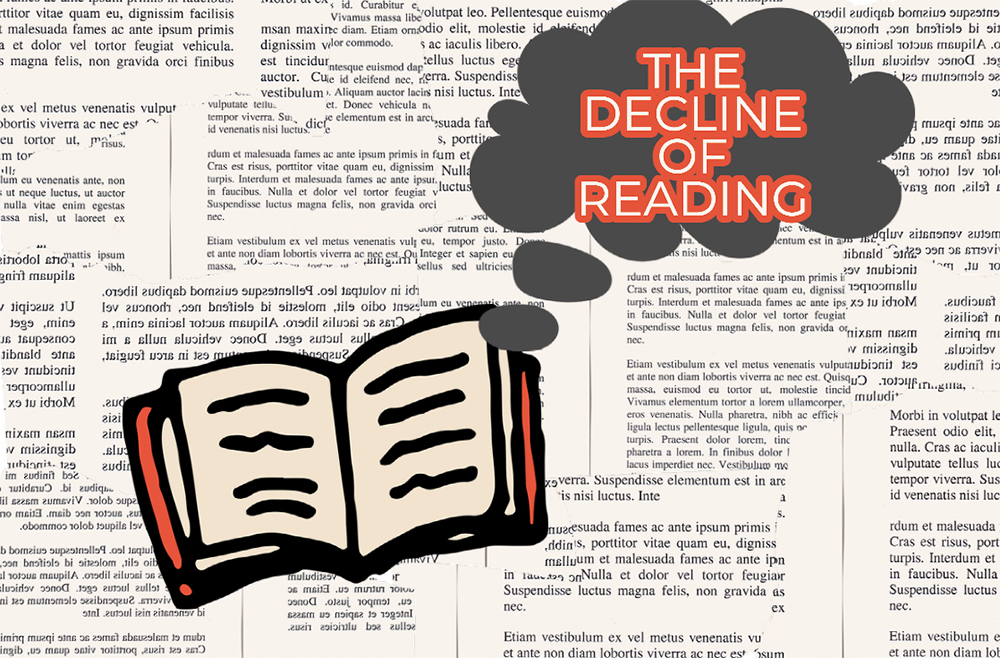Even though books are more accessible than ever in the digital age, reading rates in the U.S. have hit record lows. Across the board, nearly all age ranges of Americans are reading less than they did in the not-so-distant past. This is a troubling trend that we should both pay attention to and try our best to remedy.
The World Economic Forum found that the average time Americans spent reading for pleasure each day declined from 23 minutes to 16 minutes between 2004 and 2019. A Gallup study found that U.S. adults are reading roughly two or three fewer books per year than they did between 2001 and 2016. Even worse, the Pew Research Center concluded in a study of children aged nine, 13 and 17 years old that reading levels among those age groups are the lowest they have been in four decades.
There are many theories on why reading has declined so rapidly in such a short period of time, but I think it boils down to one dominant reason: distractions. In 2022, everything is at our fingertips all at once. There are constant distractions on our phones and televisions such as social media, emails, texts, games, streaming, news alerts and everything in between.
As more and more things suck up our time, we have less of it to spend on reading. Our attention spans begin to shrink, resulting in less focus and cognitive stamina. How can we focus on a book when we are used to watching short clips and reading quick snippets and headlines?
This is an especially relevant issue for children. After spending a large portion of time out of school during the pandemic, many children spent a great deal of time in front of screens playing games instead of reading or engaging in a classroom setting. Due to the unstudied social and developmental impacts of the pandemic, their ability to focus on a book may have been depleted, which is something that could be quite detrimental going forward.
Reading is an integral part of our intellectual development, human experience and cognitive health. According to the Center for Adult Education, reading helps adults reduce stress, decrease feelings of loneliness and isolation, sleep better at night and reduce their likelihood of developing Alzheimer’s and dementia. Another study from Business Insider found that the only commonality between 1,200 of the world’s wealthiest individuals was their love of reading.
Among children, early reading is associated with overwhelmingly positive development. A University of Rochester study found that reading helps grow their vocabulary and their understanding of the world around them. It also instills social-emotional and imaginative skills, which are necessary for children to advance and grow as they move from grade to grade.
There are things we can do to fix this issue, for the betterment of ourselves, the younger generation and the future generations to come. I used many different techniques to try to read more as I got older and more distracted, and maybe you could use some of them too.
One way to increase your reading time is to set a weekly or daily goal and set a time of day when you want to read. Another way to improve your reading habits is to remove temptations. When it comes time to read, put your phone away and sit in a space that is best suited for your reading habits. A big part of reading more is making it a pleasurable experience, so make it comforting.
You should also read what you like and stay away from what you don’t. Just because your friend is reading Proust’s “In Search of Lost Time” does not mean you have to. When you stick to what you like you are much more likely to keep reading it. Furthermore, if a book is not interesting to you, drop it and pick up a new one. This is much better than burning yourself out on one book.
It is also a good idea to surround yourself with books. Whether this means spending time at a library or buying some to put around your house, the more books the better. These are all great ways to encourage kids to read, too. If a child sees a parent or an older sibling reading a book, they will be more likely to follow suit.
If we make a conscious effort to read more often, our future selves will thank us. In a world full of distractions, it is healthy to take a breather. A book can provide pause, improve our cognitive function and ultimately help us be more connected to the world around us.




